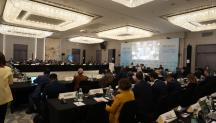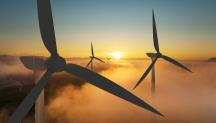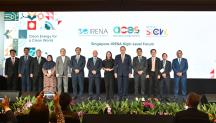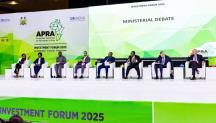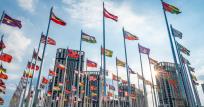

IRENA Members Advance Global Agenda on the Geopolitics of Energy Transformation
Newsletter
The world will need to manage more seismic shifts in the global energy system, including a quadrupling of renewable power capacity by 2030, to forge a pathway toward the 1.5°C goal, said IRENA Director-General Francesco La Camera at the opening of the fifth meeting of the Collaborative Framework on the Geopolitics of Energy Transformation.
Co-facilitated by Germany and the United Arab Emirates (UAE), the virtual meeting was attended by over 70 participants from Members and States in Accession with the purpose of achieving a deeper understanding of the geopolitical consequences of the ongoing energy transitions and a large-scale shift to renewable energy.
Hydrogen took centre stage at this meeting as Members prioritised the discussion around the geopolitical implications of its rapid evolution. Members exchanged views on policy considerations of IRENA’s recently released Geopolitics of the Energy Transformation: The Hydrogen Factor report and the ways hydrogen is increasingly shaping energy policy discourse.
“As we consider geopolitics and energy, hydrogen is but one of many evolving issues that we can expect to redraw the world’s energy map,” Mr. La Camera added. “We must think beyond traditional energy silos to anticipate and monitor the impacts on increasingly connected issues across sectors, economies and societies.”
HE Dr. @NAH_208 participated in the 5th Meeting of IRENA’s Collaborative Framework on the Geopolitics of Energy Transformation alongside HE Eng. @SharifAlolama, Under-Secretary of the @moeiuae, @flacamera, Director-General @IRENA pic.twitter.com/adnOI0GAyI
— UAE Mission to IRENA (@UAEMissionIRENA) April 26, 2022
Highlighting the potential of hydrogen in helping strengthen global energy security, Jennifer Morgan, State Secretary and Special Envoy for International Climate Action, German Federal Foreign Office, said the COP 26 made it clear that global energy transition must accelerate, and green hydrogen is what many of the decarbonisation dreams are made of. “Our government has doubled its ambition in green hydrogen deployment against the target in the National Hydrogen Strategy 2020. This on the basis of having committed 2 billion euros to facilitate the development of an international market,” she added.
Commending IRENA’s critical role as a platform for international cooperation on the energy transition, H.E. Eng. Sharif Al Olama, Under-Secretary of the Ministry of Energy and Infrastructure for Energy and Petroleum Affairs, UAE, said, “IRENA has been continually convening the global energy sector and offering insights into how countries and stakeholders can navigate the uncertainties and, in this case, shape the development of the hydrogen market.”
Reflecting on the discussion and turning to IRENA’s broader work on the geopolitics of energy transformation, Dr. Nawal Al-Hosany, Permanent Representative of the UAE to IRENA, emphasized the value of input from IRENA’s diverse membership in navigating a rapidly evolving energy landscape.
In closing remarks, H. E. Ernst Peter Fischer, Ambassador of Germany to the UAE, said the trend towards renewables is irreversible. “The highlight of today’s discussion is that a diverse energy mix is crucial to energy security for the entire world.”

